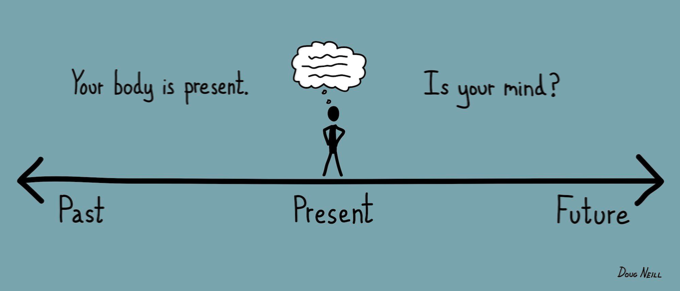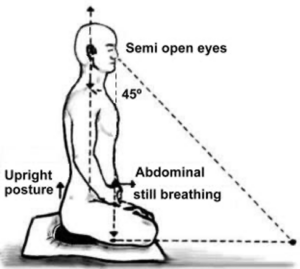The power of being present
Emotional Intelligence and meditation for leadership
“Our appointment with life takes place in the present moment, our appointment is here, in this exact place.”
Thich Nhat Hanh.
According to a Harvard study, our minds are lost in useless thoughts almost 47% of the time, wearing out an enormous amount of energy without productive results that do not contribute towards our well-being.
In fact, most of the thoughts that we have are to do with our past experiences. They may bring back feelings of guilt, resentment, depression or frustration, or they may be thoughts about our expectations of the future expectations that drive us into a state of constant anxiety, fearing about what might happen tomorrow.
If we are to became aware of ourselves and live a full and satisfying life, it is of paramount importance that we think about how our mind works. Most of us live with some dose of fear or permanent worry. These fears mostly do not correspond to a real danger that we face in the present moment, but to situations that we imagine occurring in the future. Fears can take various forms such as distress, worry, anxiety, nerves, tension, or phobia, all of which can manifest themselves physically or as recurrent thoughts and intense emotions. When these automatic and repetitive thoughts are activated, we lose not only our sense of empowerment and self-confidence, but also a large part of our energy, blocking our ability to respond to the present situation. We must learn that we can only change what is happening in the present. Everything else is an imaginary projection about the future that weakens our ability to act now.
 Picture from: https://medium.com/@gunjanjohar66/past-present-future-where-do-you-spend-your-time-45f8317cef81
Picture from: https://medium.com/@gunjanjohar66/past-present-future-where-do-you-spend-your-time-45f8317cef81
Meditation offers us a path to avoid this mental distraction. Through the practice of mindfulness we can become more aware of how our minds are distracted from the here and now. Meditation is a daily practice that can help us overcome the obstacles that take us away from being fully in the present and that therefore keep us from being fully ourselves.
Being fully present, otherwise known as mindfulness, is a Buddhist concept that refers to intentionally focussing on the here and now, and accepting reality as it is without escaping from it or making value judgements. Mindfulness is all about a “state of mind” that can be developed through the practice of meditation, a space where we cultivate self-observation and direct our full attention to what is happening around us, instant by instant.
Practicing meditation techniques is the best way to reach a state of mindfulness, however, until a few decades ago, these practices were mostly reserved for those who went to Buddhist centres or who practiced yoga. Nowadays, mindfulness is considered a highly effective practice for everyone, and leaders of large companies or organisations are increasingly choosing to develop certain skills through the practice of mindfulness. This has led to the recent emergence of a new concept of leadership in our society that is rooted in the present: the conscious leader. (Companies like Apple or Google have already integrated mindfulness as an essential part of their corporate culture).
Jon Kabat-Zinn is one of the main proponents of mindfulness in the Western world. His work and academic medical background have contributed to the growing inclusion of mindfulness in areas such as medicine, psychology, education, organisations, prisons and professional sports etc.
Recent technological developments have made it possible for us to study how the brain functions in real time, giving us evidence about the effects of certain practices on our brains. In recent decades, different medical studies have found evidence for the many benefits of mindfulness on our brains and wider lives. It can prevent certain health problems and considerably reduce stress and anxiety. It can also improve skills such as attention span, concentration and memory, as well as helping to develop emotional intelligence and improving interpersonal relationships, promoting creativity, decision-making skills and the ability to acquire new perspectives.
Through the practice of mindfulness we can cultivate an understanding of the mind based on experience. We can begin to observe our automatic behaviours, move beyond them, and become objective observers of our thoughts, emotions and physical sensations. We could describe this as “waking up from a life on autopilot” and becoming more sensitive to everyday experiences. The key is to observe with full attention and without judgment, allowing anything that emerges simply “to be”, without getting hooked on thoughts or emotions that obstruct an awareness of and connection with the present moment. This goes beyond mere intellectual knowledge, it is a different quality of knowledge that can only be acquired through experience. It would be like explaining to someone how a flower smells, or how chocolate tastes. It must be experienced to be understood. On the other hand, this is an extraordinarily simple state. Buddhism claims that this is our natural state of being.
Jon Kabat-Zinn explains how Buddhism uses the same word (‘Citta’) for both mind and heart. A state of mindfulness includes a quality of affection and compassion, a sense of presence and generous interest. In mindfulness, compassion is understood as an inherent human quality and the natural result of meditation. The attention of the mind is a natural quality that we all share as human beings; we are all attentive to a greater or lesser extent. The contribution of the Buddhist tradition has been to develop simple and effective methods for cultivating and refining this capacity and bringing it to all aspects of daily life.
By getting in touch with compassion and self-compassion through mindfulness, we can open ourselves to whatever life brings without interfering with mental judgements. We can learn to accept life as it comes, giving space for both joy and suffering. Compassion is a powerful emotion that helps us to minimise the impact of difficult and painful experiences without trying to escape from them. It helps us to find acceptance and offers us the potential of integrating difficult experiences as part of our human experience, transcending them into a deeper meaning that will become our inner wisdom. This inner wisdom will be the result of our own life process, and this unique richness will be the field of our leadership, enabling us to accompany, encourage, and inspire others in their own development.
Main aspects of meditation
Meditation is focused mainly on staying still and maintaining a sustained attention on breathing and on any bodily sensations. It requires you to just let thoughts pass through your mind without focusing on them directly or grasping onto them. Breathing provides direct access to the power of the present moment. Stay still with your attention focused on your breathing and an awareness of your senses. This will bring you back to yourself.
The body is always in the “here and now”. Body awareness brings us into the present moment. It is the mind that wanders in thoughts and phantasies about the present and ends up missing what is really happening. Nothing happens outside the present moment except in our imagination.
Mindfulness can be practiced in a formal way, namely with traditional meditation or the Zazen posture: this means sitting still in a lotus position for a certain period of time with the attention focused on breathing and on maintaining the meditation posture.
 Picture from: http://holistic-health.org/boulder/?p=516
Picture from: http://holistic-health.org/boulder/?p=516
Alternatively, non-formal mindfulness invites us to pay undivided attention to our everyday routines. Instead of living automatically, lost in worries or thoughts, we step out from them to meet real life.
“Eat breakfast, conscious of each bite.
Walk thought the city, conscious of each footstep.
Sense the richness of the experiences that unfold around you.
Hear the birds singing, see the trees waving, feel the heat of the sunshine.
Listen to someone fully, sensing with your whole body.
And suddenly real life is met, arising naturally inner fulfilment.”
A leader who incorporates mindfulness as a practice for personal development will become more rooted in the present and will be able to realise their potential. They will develop a deeper knowledge of themselves and no longer need to look for outside references to contribute to their own authenticity. They will be able to guide others and support them in the way they have walked, respecting and caring naturally for the environment that they are consciously connected to. They will have the ability to respond in a coherent way to the challenges life may bring, because they have become open, receptive and rooted in themselves. They are the quiet stillness in the centre of a hurricane. And they will naturally become a reference for others.
Bibliography
- Tolle, E. (2004). The power of now: A guide to spiritual enlightenment. Ed. Namaste Publishing.
- Jon Kabat-Zinn (2017). Mindfulness for beginners. Ed. Jaico.
- Thich Nhat Hanh (1999). The miracle of mindfulness. A manual on meditation.
Laura Lopez Gámez
 I am a psychologist with great experience as trainer in Humanistic approaches; on Body movement and Corporal Expression (Río Abierto), Vital Readjustment facilitator, MBSR in Mindfulness and Gestalt therapy. I work mainly in the areas of Conflict Resolution, Emotional Intelligence, and Leadership with holistic practices that bring self-alignment.
I am a psychologist with great experience as trainer in Humanistic approaches; on Body movement and Corporal Expression (Río Abierto), Vital Readjustment facilitator, MBSR in Mindfulness and Gestalt therapy. I work mainly in the areas of Conflict Resolution, Emotional Intelligence, and Leadership with holistic practices that bring self-alignment.


